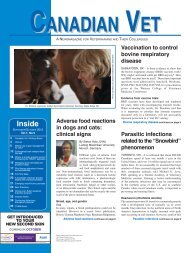canadian vet - K2 Animal Health Publishing
canadian vet - K2 Animal Health Publishing
canadian vet - K2 Animal Health Publishing
You also want an ePaper? Increase the reach of your titles
YUMPU automatically turns print PDFs into web optimized ePapers that Google loves.
May/June 2012 Canadian Vet23<br />
Best Practices<br />
Neuroscience insights to increase performance<br />
Neuroscience is the study of the nervous system and its relationship<br />
to behaviour and learning. Neuroscience is being used to manage<br />
talent in today’s business environments. Below is a summary of some<br />
pertinent information and facts about neuroscience and its effects on<br />
performance.<br />
• Goals are necessary to motivate us to perform. Realistic attainable<br />
goals stimulate the release of neurochemicals (dopamine), which<br />
motivate us to achieve the goals. In addition, goal setting triggers<br />
the brain to selectively filter and use important information to assist<br />
us with goal attainment.<br />
• A calm state of mind leads to insightful ideas. Alpha brainwaves<br />
result in a calm brain state. This calm brain state is required before a<br />
burst of gamma brainwaves can occur. A burst of gamma brainwaves<br />
occurs when we develop a “bright idea”.<br />
• Sleep deprivation affects performance in many ways including the<br />
ability to remember, learn, pay attention, and make decisions. Older<br />
adults perform better than younger adults when sleep deprived.<br />
Sleep deprived younger adults are more likely to inaccurately<br />
overstate their abilities. Women have more sleep problems than men;<br />
however, women generally perform better when sleep deprived than<br />
men with the following exception: women are less likely to be able<br />
to accurately interpret the emotions of others when they are sleep<br />
deprived. For example, they are less able to accurately interpret a<br />
smile or a frown on someone’s face when sleep deprived, potentially<br />
leading to an inappropriate response.<br />
• Thirty minutes of aerobic exercise improves “executive” functions<br />
in the brain, which include the ability to pay attention, plan, organize,<br />
and make decisions.<br />
• Multi-tasking is often considered highly desirable and productive<br />
behaviour; however, adding a task reduces the performance in ALL the<br />
tasks. Multi-tasking can also impair memory retention and learning.<br />
• There is a relatively inexpensive way to reduce stress, improve<br />
attention, and to increase performance in the workplace – mindfulness<br />
meditation. Google, Microsoft, Proctor and Gamble, Comcast, and<br />
many more successful companies have incorporated mindfulness<br />
training into their organization. Mindfulness training has its roots<br />
in Buddhist meditation. It deals with focusing one’s attention on<br />
the present moment. Research studies on mindfulness training<br />
have demonstrated that mindfulness training can significantly<br />
improve an individual’s emotional<br />
wellbeing. Training to live in the<br />
present moment reduces stress<br />
and improves immune function.<br />
It increases an individual’s ability<br />
to pay attention and it has led to<br />
enhanced academic performance,<br />
particularly among women.<br />
Elizabeth Bellavance,<br />
DVM, MBA, CMA<br />
• Leaders in the workplace have the choice of motivating employee<br />
behaviour and performance with rewards or threats. Our brains<br />
respond differently when we are exposed to threatening situations<br />
versus rewarding situations. The neurochemical dopamine is released<br />
in a rewarding environment contributing to increased performance<br />
while our brain releases cortisol in a threatening environment which<br />
can contribute to decreased performance. A positive supportive work<br />
environment can improve employee effectiveness and performance.<br />
• A study on the results of performance reviews revealed that only<br />
30% of employees had improved performance after receiving<br />
feedback from their performance review. In contrast, 40% of<br />
employees experienced a decline in performance. Thirty percent<br />
had no change in their performance. Reviewing an employee’s past<br />
performance and providing negative feedback can trigger a threat<br />
response and decrease performance. Setting goals in the form of<br />
tasks and discussing the achievement of those goals will result in<br />
more favourable performance outcomes.<br />
More and more businesses today are realizing that science, and<br />
in particular neuroscience, is key to understanding and driving<br />
performance in the workplace.<br />
Reference<br />
Vorhauser-Smith, S. The Neuroscience of Performance: People at<br />
Their Best. Page Up People White Paper, July, 2011.<br />
Elizabeth Bellavance, DVM, MBA, CMA, CEPA, is a member of the<br />
Board of Directors of VetPartners, a member of the Veterinary<br />
Valuation Resource Council (VVRC), and a member of the Canadian<br />
Institute of Business Valuators. Dr. Bellavance can be contacted at<br />
Elizabeth.Bellavance@gmail.com.<br />
Sponsored by Merck <strong>Animal</strong> <strong>Health</strong><br />
OVMA 2012 Conference, Toronto, ON<br />
The Exhibit Hall was a popular draw<br />
Delegates get a demonstration at one of the booths<br />
The small animal sessions were very popular





